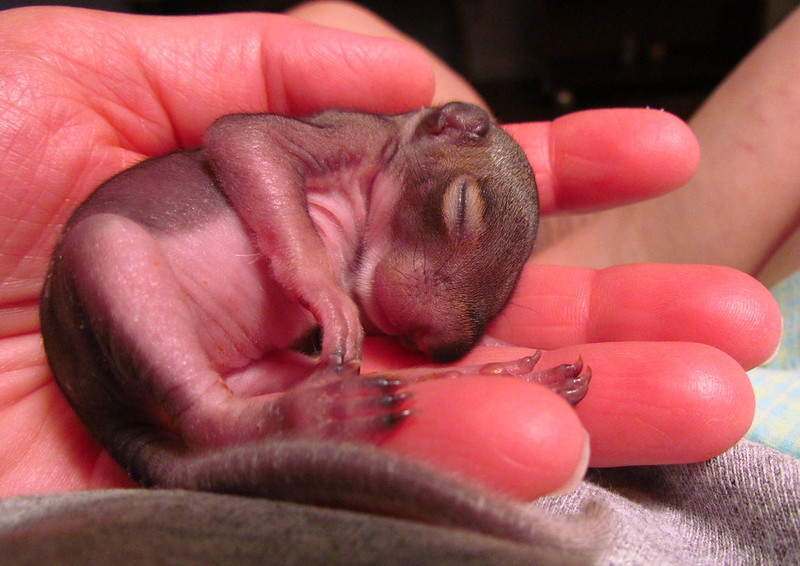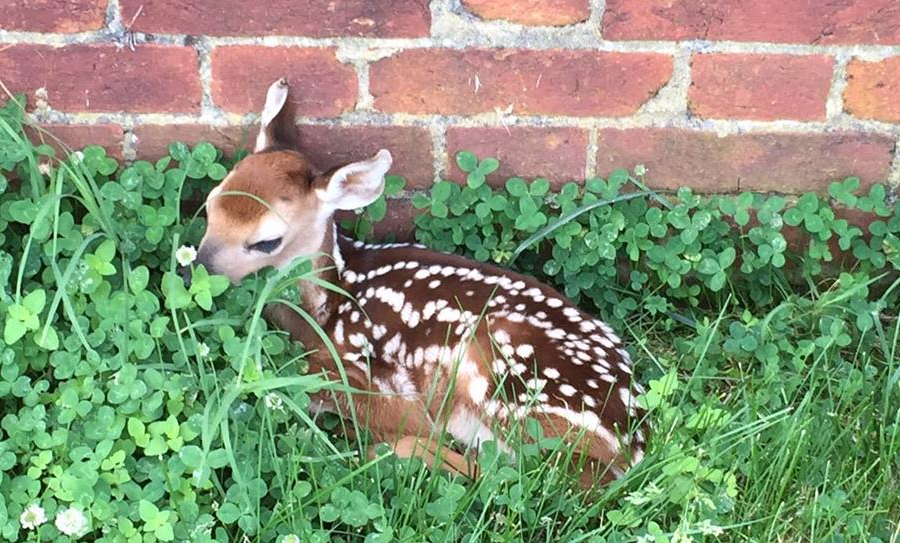
wildlife rehabilitators deal with a surge of baby squirrels that fall out of nests each year
Source: Audrey, Baby Squirrel

wildlife rehabilitators deal with a surge of baby squirrels that fall out of nests each year
Source: Audrey, Baby Squirrel
It is not legal to possess wildlife in Virginia without a permit. People may not steal babies from nests and make pets from squirrels, birds, etc. Even if a baby squirrel or bird or rabbit appears at a doorstep, people who are willing to got involved must transfer the animal to a licensed wildlife rehabilitator.
Pet are owned by people, but wild animals are a state-managed resource and not private property. Animals - unlike plants, move across state boundaries as well as the property lines of individual landowners.
A tree on a private parcel is the property of the landowner. So long as no endangered species are involved, and there is no local land use restriction associated with a rezoning proffer, landowners can cut down a tree for firewood or esthetic reasons without a permit.
Wildlife are not owned by landowners. Capturing, injuring, or killing wildlife requires a permit except for species designated as varmints. Hunting licenses and seasons control the way game animals are managed by the Virginia Department of Wildlife Resources.
There are some Federal mandates as well, for migratory and endangered species in particular. Retaining naturally-discarded feathers from a bird can violate the Migratory Bird Treaty Act, though there are exceptions for legally-hunted migratory gamebirds and for Native American use.1
Well-intentioned residents may see a deer fawn or feathered young birds nearby and think tyhe animal needs to be rescued. In many cases, the most appropriate response is "do nothing" and wait for the mother to return. Too often, "rescue" is actually interference with natural behavior.2

does return to their fawns, who are "parked" rather than "abandoned" for portions of the day
Source: National Park Service, White-tailed deer (Odocoileus virginianus) fawn
More babies are born in the springtime and summer than survive through the fall and winter. In reality, nature is "red in tooth and claw" and most of the offspring will not survive. If it were otherwise, Virginia would be covered with critters after a few years.
There is a balance in nature where some animals survive and others die. Humans, however, are inclined to rescue individual animals even if they understand "survival of the fittest" intellectually.
When a nest from an oak tree falls onto a driveway after a storm, landowners may find hairless baby squirrels whose eyes have not opened yet. It is illegal to keep wildlife, even defenseless squirrels from a fallen nest. Wild animals are not suitable for raising as pets.
The appropriate response is to put a sock on a hand, brush ants off, hold the babies to keep them warm, then contact the Wildlife Rescue League to identify the local wildlife rehabilitator who is available. Feeding squirrels milk is not appropriate; their digestive systems are designed for just what the mother squirrel can provide.
Wildlife rehabilitators have three options. They can euthanize animals that can't be helped, often because the damage is too great and sometimes because the rehabilitation facility is overwhelmed with hurt animals. The other two options are to treat the animal and release it back into the wild, or to treat the animal but keep it in captivity because it could not survive naturally again.
Wildlife rehabilitators receive special training. In many cases animals need primarily nurture, but dealing with injuries typically requires professional veterinarian care.
The Wildlife Center of Virginia south of Waynesboro provides specialized veterinary and rehabilitative care. The facility was started in 1982, and by 2023 it had treated more than 90,000 wild animals. It hosts school groups for education, and holds open houses each year so the general public can become familiar with its operations.
Animals that were treated but not released end up as "ambassadors" of their species for education. Some are used for very young rescued animals to imprint on the correct species, rather than on humans. A rehabilitated Great Horned Owl at the Wildlife Center of Virginia helped raise 50 owlets, so many that one year Virginia Living magazine gave the owl its annual Coolest Dad award.3
About 20% of the patients admitted to the Wildlife Center of Virginia are songbirds. Nearly 1,000 songbirds were processed in 2024, many with fractures and head trauma from collissions with vehicles and structures. If nestlings can not be returned quickly to the wild, the young birds must be fed every 15-30 minutes. Of all the animals brought to the Wildlife Center of Virginia , about 1/3 are successfully released.4
Most of the eagles treated at the Blue Ridge Wildlife Center were injured by collisions with cars or trucks on the highway. Others are suffering from neurological problems and organ failure after ingesting lead.
Multiple species of birds, including vultures and crows, end up with toxic levels of lead after feeding on deer and other animals shot by hunters. A gut pile from a field-dressed deer is a food source that will be consumed within a day. Lead fragments within the discarded parts of hunted animals are eaten by scavengers, then dissolve and get transported to the scavenger's brain. Wildlife rehabilitation centers can save some birds, but must euthanize others that were too damaged to survive.
Most hunters seeking deer, bear, upland birds, and squirrels still use lead shot. Waterfowl hunters are required to use non-toxic steel shot, so the problem of lead ingestion is reduced in the Coastal Plain wetlands.5
Source: Wildlife Center of Virginia, Lead Toxicity in Raptors
Many rehabilitation networks rely upon donations to cover the costs of food, shelter, medicine and veterinary care. Evylyn's Wildlife Refuge in Suffolk, which dealt with 2,500 animals in 2024, spent $3,000/month for fish to feed six baby otters.
As part of Evylyn's Wildlife Refuge, 40 volunteers across the state handle any species that is native to Virginia (so feral cats are excluded), including bats. It deals with 300-400 raccoons per year, despite the risk of rabies. Volunteers feed raccoon babies every four hours, and raccoons are kept for around six-eight months until the young have learned to climb trees and forage for food. Beavers are kept for up to two years.6